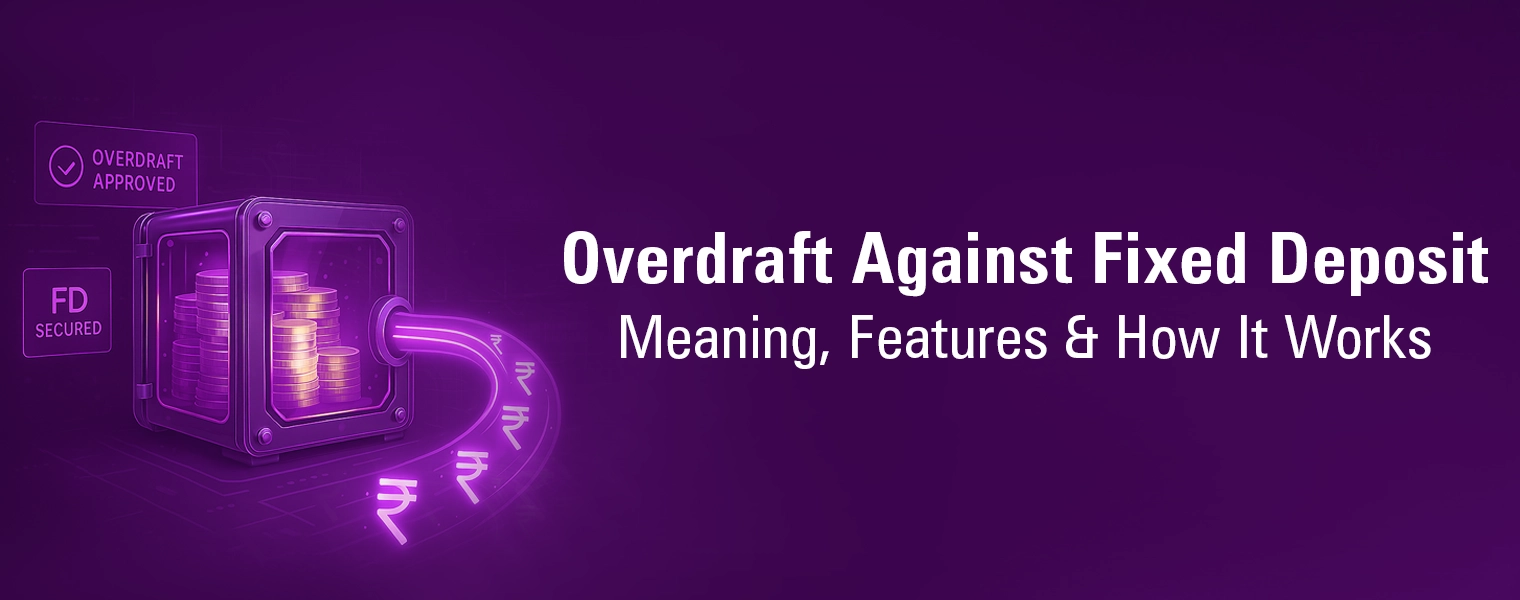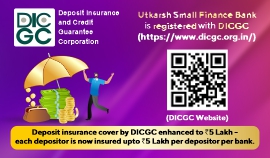When unexpected expenses arise, many Indians instinctively think about breaking their fixed deposits to access immediate funds. But what if there was a smarter way to get the money you need without sacrificing your investment returns? Overdraft Against Fixed Deposit (FD) offers exactly that solution – providing instant liquidity while keeping your FD intact and earning interest.
At Utkarsh Small Finance Bank, we understand that financial emergencies don't wait for convenient timing. Our overdraft facility against fixed deposits ensures you can access funds quickly without disrupting your long-term financial goals. Let's explore how this powerful financial tool can work for you.
What is Overdraft Against Fixed Deposit?
Overdraft Against Fixed Deposit is a secured credit facility that allows you to borrow money against the value of your existing fixed deposit without breaking it prematurely. You’re using your FD as security to get a loan, all while it continues to earn interest.
Here's how it works in simple terms: If you have a fixed deposit of ₹5 lakh, you can typically get an overdraft facility of up to ₹4.5 lakh (90% of the FD value). You’re only paying interest on the funds you utilize, not the total credit available. The beauty of this arrangement lies in its dual benefit – your FD keeps earning its contracted interest rate while you access the funds you need at competitive rates. You get the benefit without giving anything up.
Key Terminology
- Overdraft Limit: The maximum amount you can withdraw (typically 80–90% of the FD value). At Utkarsh Small Finance Bank, eligible customers can access up to 80-90% of their fixed deposit amount, ensuring substantial liquidity when needed.
- Interest Spread: Additional interest charged above your FD rate (usually 2%).
- Lien: A legal claim the bank places on your FD as security.
Features of Overdraft Against Fixed Deposit
- Competitive Interest Rates: The interest rate on overdraft facilities is 2% above the FD interest rate. For instance, if your FD earns 8% per annum, your overdraft rate would be 10% per annum. It offers a more affordable alternative to personal loans and credit cards.
- Flexible Utilization: You pay interest only on the amount you withdraw and use, not on the total sanctioned limit. This means if you have a ₹5 lakh overdraft limit but only use ₹1 lakh, you'll only pay interest on ₹1 lakh.
- No Processing Fees: Unlike personal loans that come with processing fees ranging from 1–3% of the loan amount, overdraft against FD typically comes with zero processing fees. Utkarsh Small Finance Bank offers this facility with nil processing fees, making it even more cost-effective.
- Immediate Liquidity: Once approved, you can access funds immediately through various channels including internet banking, or cheque books. There's no waiting period for fund disbursement.
- Preservation of FD Benefits: Your fixed deposit continues to earn interest at the contracted rate even while serving as collateral. This ensures your future investment goals stay on track.
How Does Overdraft Against FD Work?
Benefits of Choosing Overdraft Against FD
Financial Advantages
Operational Benefits
Eligibility Criteria
The following conditions must be satisfied to access an overdraft against fixed deposit:
Basic Requirements
Entity Types Eligible
The following groups are eligible to access this facility at Utkarsh Small Finance Bank:
FD Requirements
Application Process
Offline Application
For those preferring branch visits:
Required Documents
Comparison with Other Financing Options
Overdraft vs. Personal Loan
Overdraft vs. Breaking FD
Utkarsh Small Finance Bank's Overdraft Against FD
Key Features
Eligibility
Utkarsh Small Finance Bank extends this facility to individuals, HUFs, partnership firms, and companies. The Bank's approach focuses on providing maximum flexibility to customers while maintaining competitive rates.
Digital Integration
The Bank offers seamless digital integration, allowing customers to manage their overdraft facilities through net banking and mobile banking platforms.
Interest Rates and Charges
Current Market Rates (as of 2025)
Utkarsh Small Finance Bank Rates
Interest Taxation
Income Tax Considerations
Things to Consider
Advantages
Limitations
Best Suited For
Tips for Optimal Usage
Smart Usage Strategies
Risk Management
Conclusion
Overdraft against a Fixed Deposit represents a perfect blend of liquidity and investment preservation. For customers of Utkarsh Small Finance Bank and other financial institutions, this facility offers a smart alternative to breaking FDs or taking expensive personal loans. The key lies in understanding when and how to use this facility optimally.
Whether you're facing a medical emergency, a business opportunity, or any other financial need, an overdraft against an FD provides the flexibility to access funds while keeping your long-term investments intact. With competitive rates, zero processing fees, and the flexibility to repay as per your convenience, this facility truly embodies the principle of having your cake and eating it too.
As you plan your financial strategy, consider how an overdraft against an FD can serve as a valuable tool in your financial toolkit. Remember, while this facility offers numerous benefits, it's essential to use it judiciously and maintain discipline in repayment to maximize its advantages. Always consult with your bank's relationship manager to understand the specific terms and conditions applicable to your situation.
For more information about Utkarsh Small Finance Bank's overdraft against FD facility, visit www.utkarsh.bank or your nearest branch. Our team is always ready to help you make the most of your financial investments while ensuring liquidity when you need it the most.
- Collateral Setup: Your existing fixed deposit serves as security for the overdraft facility. The bank places a lien on your FD, which means they have a legal claim over it until you repay the overdraft amount.
- Limit Determination: The bank determines your overdraft limit based on a percentage of your FD value. Factors affecting this percentage include:
- Type of FD (regular, senior citizen, etc.)
- Tenure of the deposit
- 's internal policies
- Your relationship with the bank
- Interest Calculation: Interest is calculated daily on the outstanding amount. This means:
- If you use ₹50,000 for 10 days, you pay interest only for those 10 days.
- The moment you deposit money back, the outstanding amount reduces and so does the interest.
- No interest is charged on unused portions of the overdraft limit.
- Flexible Repayment: Overdrafts let you repay at your own pace, unlike fixed-EMI traditional loans. You can:
- Repay the entire amount at once.
- Make partial payments as per your cash flow.
- Just add funds to your account to lower the amount you owe.
- Lower Interest Costs: With rates typically 2% above FD rates, this facility is significantly cheaper than personal loans (10–24% per annum) or credit cards (18–42% per annum).
- No Prepayment Penalties: You can repay the overdraft amount anytime without any prepayment charges. This freedom helps you reduce the total interest paid.
- Continued FD Earnings: Your fixed deposit continues to earn interest, partially offsetting the cost of borrowing. In certain scenarios, your actual borrowing expense is quite low.
- Efficient Approval: With your FD as a guarantee, lenders can process loans faster than unsecured ones. Documentation is minimal, and approval can happen within hours.
- No Credit Score Impact: The secured nature of this facility means it has a minimal impact on your credit score. Making regular repayments helps strengthen your credit profile.
- Emergency Fund Access: It serves as an excellent emergency fund option, providing peace of mind that you can access substantial funds quickly when needed.
- Age: 18 years or above.
- FD Ownership: Must have a fixed deposit with the bank.
- Tenure: The FD should typically have a minimum tenure of 6 months.
- Residency: Indian resident.
- Individual Residents of India
- Sole Proprietorships
- Hindu Undivided Family (HUF)
- Partnership Firms
- Public and Private Limited Companies
- Trust, Association, Society, and Club (TASC)
- The FD must be in the applicant's name (joint holdings allowed).
- An auto-renewal instruction may be required.
- Minimum FD amount thresholds may apply.
- Tax-saving FDs and Recurring Deposits are generally not eligible.
- Visit your nearest Utkarsh Small Finance Bank branch.
- Fill out the overdraft application form.
- Submit the required documents.
- Complete the verification process.
- Await approval and limit sanctioning.
- Overdraft Application Form
- Original FD receipt
- Demand Promissory Note (DPN)
- Lien Letter (part of the application form)
- Interest Rates: Personal loans typically range from 10–24% per annum, while an overdraft against an FD costs only 1–2% above your FD rate.
- Processing Time: Personal loans can take 2–7 days for approval, while overdraft facilities are often approved within hours.
- Collateral: An overdraft uses your fixed deposit as security—something personal loans don’t require.
- Flexibility: Unlike personal loans, which lock you into EMIs, overdrafts give you flexible repayment options.
- Penalties: Breaking an FD prematurely attracts penalties of 0.5–1% of the principal amount, while overdraft facilities have no such penalties.
- Interest Loss: Premature withdrawal results in reduced interest rates for the period the FD was held, while an overdraft keeps your FD earning at contracted rates.
- Future Planning: Breaking an FD disrupts your long-term financial planning, while an overdraft maintains your investment strategy.
- Overdraft Limit: Up to 90% of your FD value.
- Interest Rate: 2% above the term deposit rate.
- Processing Fee: Nil.
- Tenure: Flexible, typically linked to the FD tenure.
- Minimum Amount: No minimum restriction mentioned.
- Interest is usually charged at 2% above the applicable FD rate.
- Processing Fee: Usually nil for most banks.
- Prepayment Charges: Generally not applicable.
- Annual Maintenance: Minimal or no charges.
- Interest Rate: 2% above the term deposit rate.
- Processing Fee: Nil.
- Other Charges: Refer to the Bank's current schedule of charges.
- FD Interest: Continues to be taxable as per your income tax slab.
- Overdraft Interest: No tax-deduction unless used for business purposes.
- The interest earned on an FD remains taxable even when used as collateral.
- Overdraft interest paid is generally not deductible for personal use.
- Businesses may be able to claim overdraft interest as an expense.
- Cost-effective compared to other loan options.
- Quick access to funds without breaking investments.
- Flexible repayment options.
- No impact on credit score (if managed properly).
- Continued FD benefits and interest earning.
- Limited to the FD value (maximum 90% typically).
- Tenure restrictions may apply.
- Auto-renewal requirements for the FD.
- The fixed deposit remains under lien until the overdraft is fully repaid.
- Variable interest rates may apply.
- Emergency fund needs
- Short-term liquidity requirements
- Business working capital (temporary)
- Avoiding FD premature withdrawal penalties
- Maintaining investment discipline
- Use only when necessary to minimize interest costs.
- Repay quickly to take advantage of the daily interest calculation.
- Monitor usage regularly through net banking.
- Keep the FD auto-renewal active to maintain the facility.
- Compare rates across different banks.
- Don't over-utilize the facility.
- Maintain discipline in repayment.
- Keep track of outstanding amounts.
- Plan repayment from expected income sources.
- Avoid using it for speculative investments.




